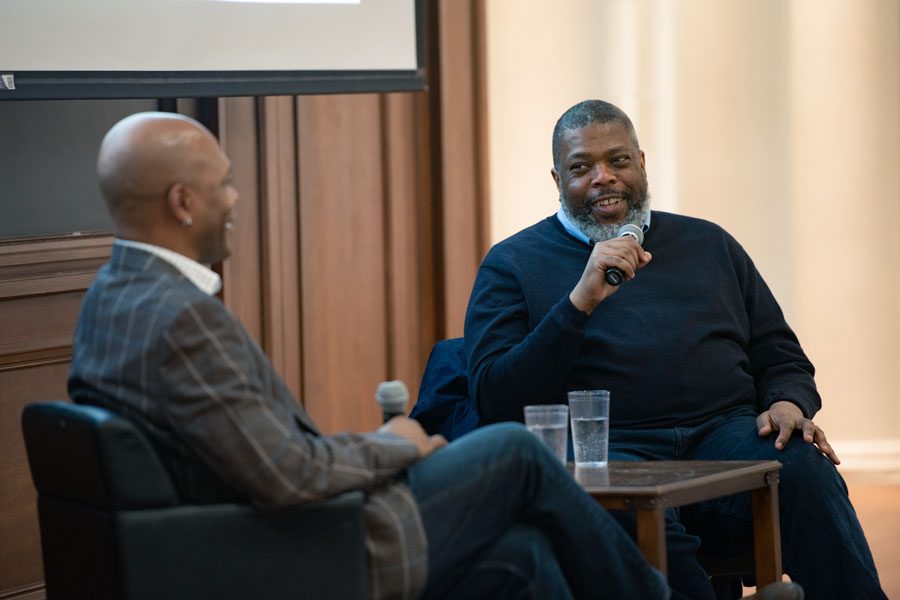New Yorker critic Hilton Als talks cultural criticism and representation at CTSS event
Evan Robinson-Johnson/Daily Senior Staffer
New Yorker theatre critic Hilton Als speaks as part of Contemporary Thought Speaker Series. Als discussed the role of criticism in art.
April 9, 2019
When asked how someone were to become a professional critic, New Yorker theater critic and Pulitzer Prize winner Hilton Als laughed and says it’s hard to give a simple answer.
“That’s sort of like asking how you become a professional pretzel maker,” Als said. “You have to love pretzels.”
A writer for the New Yorker since 1994 and the winner of the Pulitzer Prize for cultural criticism in 2017, Als spoke about cultural criticism, representation and being a gay black man in media at Harris Hall on Monday. The conversation was moderated by Weinberg Prof. E. Patrick Johnson and was presented by the Contemporary Thought Speaker Series.
Als said that as a young man, he never anticipated becoming a critic. His career path ended up being a way for him to retain his passion for essay-writing, despite it not being a particularly profitable form of writing. When he was starting as a professional, Als said he was mentored by older gay men in the publishing business. One of these mentors would take him to the ballet and theatre and was so impressed by Als’ remarks about the shows that he later helped Als secure his first job as a reviewer for a ballet review magazine when he was 21 years old.
While he remains best known for his role as a theater critic, Als has branched out in recent years, and has now written about a wide variety of cultural topics, including books about celebrity and pop culture figures. His book “White Girls” was released in 2013.
Als said that he approaches every piece of criticism he produces as a learning experience to expand his worldview, and that he looks at every medium the same way so as not to sacrifice the sensibility he brings to cultural writing.
During the event, Johnson and Als discussed the significance of Als’ position as a queer black man with a platform in a reputable publication like The New Yorker. Als said that he has tried to use his position to bring artists of color into the publication, and spotlight people and artistic movements that haven’t necessarily always gotten the recognition they deserve by majority-white publications like the one he works for. Als described himself as a trying to be a “rewarder critic” — someone who seeks out art by underrepresented populations who deserve recognition.
“As opposed to feeling targeted in a larger white institution, I wanted to turn things around and make the institution pay attention,” Als said.

Weinberg Prof. E. Patrick Johnson and Als converse in Harris Hall. Als said he uses his position at The New Yorker to bring artists of color to the publication.
According to CTSS co-president and Medill junior Amanda Gordon, CTSS wanted to bring Als to campus because its members admired him for his unique voice as a cultural critic. His commitment to diversity and representation in the newsroom is admirable and important to discuss, Gordon said, especially at a school like Northwestern.
“(Bringing in more voices of color) is a really important thing that we need to talk about in the media,” Gordon said. “And of course Northwestern has a huge journalism community. The Medill community is so vibrant here, that I think those conversations are particularly salient here.”
Als said while he never felt lonely as a minority in the newsroom, and he was proud of how digital media has brought in more and more diverse young writers. But to this day, he still feels that there is work to be done. Als mentioned that when he gets complimentary tickets from PR people outside theaters, many of them treat him with trepidation.
“There’s still that,” Als said. “That’s a drag.”
Johnson and Als discussed the impact critics have on artists and the way art is viewed, and whether or not critics should be self-aware about the power they hold over artists.
“As you know, for artists, critics are the bane of their existence,” Johnson said. “And sometimes different artists handle reviews in different ways.”
However, Als was adamant that self-awareness of one’s influence is inherently detrimental to a critic’s abilities as a writer. Als said that, even after his years of experience, he never approaches art as if he is an expert. Instead, he tries to research and read about the creators and hold a “dialogue with the artist through context,” in order to get a sense of who they are and engage with the work in a genuine manner.
“The thing that makes me happy about my criticism, in particular, is that it allows people to speak to me,” Als said. “I don’t like critics who say what the thing is and there is no room for discourse.”
Email: [email protected]
Related Stories:
– Northwestern to host New Yorker theater critic Hilton Als
– Actress, writer Lena Waithe discusses TV career, representation in the industry
– Political experts talk Trump, midterm elections at CTSS event


